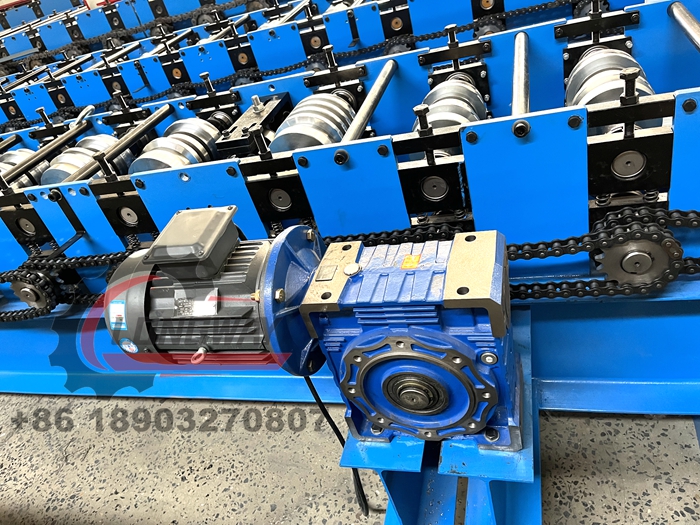Roll Forming Machine for Drywall Stud Profile Production and Fabrication Solutions
Roll Forming Machines for Drywall Profiles
In the realm of construction and interior design, the use of drywall is ubiquitous, providing a quick and efficient way to create walls and ceilings. Among the key components in the drywall system are the metal profiles that support and shape these panels. The roll forming machine for drywall profiles, specifically designed for the production of perfil drywall parante, plays an essential role in modern construction, offering precision and efficiency.
What is a Roll Forming Machine?
A roll forming machine is a type of industrial equipment used for shaping metal sheets into specific profiles. This machine operates by continuously feeding a metal strip through a series of rollers, which bend the strip into the desired shape. With the capability to produce long lengths of profiles at high speeds, roll forming machines are favored in industries that require consistent and uniform components, such as automotive, construction, and appliance manufacturing.
The Importance of Drywall Profiles
Drywall profiles are critical for the structural integrity and aesthetic finish of drywall installations. These profiles, typically made from galvanized steel, function as the framework upon which drywall boards are mounted. The most common profiles used include studs, tracks, and angles, each designed to cater to particular installation requirements. Stud profiles, for example, are vertical members used to support the drywall, while tracks provide a base and top anchor for the walls.
Using quality drywall profiles ensures not only the stability of the wall structure but also the longevity of the installed drywall, reducing the risk of sagging or warping over time. Moreover, the precision in their manufacturing directly affects the ease of installation and the overall finish of the drywall system.
Advantages of Roll Forming Machines
1. Precision and Accuracy Roll forming machines are known for their ability to produce components with tight tolerances. The automation involved in the roll forming process minimizes human error and ensures that each profile meets exact specifications.
roll forming machine for perfil drywall parante

2. Efficiency Once set up, a roll forming machine can operate continuously, producing thousands of profiles per hour. This efficiency reduces production times and labor costs, making it an economically sound choice for manufacturers.
3. Material Utilization Roll forming is a near-net-shape process, meaning that it generates minimal waste compared to other metal forming methods. This not only conserves resources but also lowers costs for manufacturers.
4. Versatility Roll forming machines can be designed to create a variety of profiles by simply changing the roller sets. This flexibility allows manufacturers to cater to diverse customer needs without significant downtime.
5. Customization Options Manufacturers can easily customize profiles to meet specific architectural requirements or client requests. This adaptability is especially valuable in a field like construction, where projects often demand unique solutions.
The Future of Roll Forming Machines in Construction
As the construction industry continues to evolve with the introduction of new materials and techniques, the role of roll forming machines will only become more significant. The growing trend towards sustainable building practices and energy-efficient designs will likely drive innovation in profile manufacturing. Moreover, advancements in technology, such as automation, artificial intelligence, and improved metallurgy, will enhance the capabilities and efficiency of roll forming machines.
Additionally, the increasing demand for prefabricated construction components, particularly in modular and off-site construction, will position roll forming machines as vital equipment. These processes not only expedite construction timelines but also ensure quality control, making roll forming a preferred choice for manufacturers aiming to meet modern construction demands.
Conclusion
In summary, roll forming machines for drywall profiles, particularly perfil drywall parante, represent a convergence of technology, efficiency, and quality in the construction industry. Their ability to produce high-precision, uniform metal profiles is crucial for the structural integrity of drywall installations. As the industry moves towards more sustainable practices and innovative construction methods, the importance of these machines will undoubtedly continue to grow, paving the way for a more efficient future in building design and construction.
-
Roof Panel Machines: Buying Guide, Types, and PricingNewsJul.04, 2025
-
Purlin Machines: Types, Features, and Pricing GuideNewsJul.04, 2025
-
Metal Embossing Machines: Types, Applications, and Buying GuideNewsJul.04, 2025
-
Gutter Machines: Features, Types, and Cost BreakdownNewsJul.04, 2025
-
Cut to Length Line: Overview, Equipment, and Buying GuideNewsJul.04, 2025
-
Auto Stacker: Features, Applications, and Cost BreakdownNewsJul.04, 2025
-
Top Drywall Profile Machine Models for SaleNewsJun.05, 2025








